Why 'Non-deployment' Funds Are Important
I saw the logic of the way Arkansas organized its broadband event into a series on panels on ‘infrastructure’ and ‘non-deployment’.

HOT SPRINGS, Arkansas, July 1, 2024 – The Arkansas BEAD Development Conference here on Tuesday, which gathered hundreds of individuals around the theme of ensuring better broadband for all Arkansans, elegantly wove together issues of infrastructure with issues of adoption and use.
As the former director of the Illinois state broadband office, the conference’s sessions were of more than casual interest. The Arkansas office told an effective story that (a) Arkansas needs but is well on its way to getting better broadband, and (b) Arkansas is far more prepared than the average state to translate that high-speed internet into better lives.
Tuesday morning’s sessions on infrastructure raised questions – and hopefully provided answers – on what the state and the federal government is doing to implement the Broadband Equity, Access and Deployment grant program of the U.S. Commerce Department.
Tuesday morning panels:
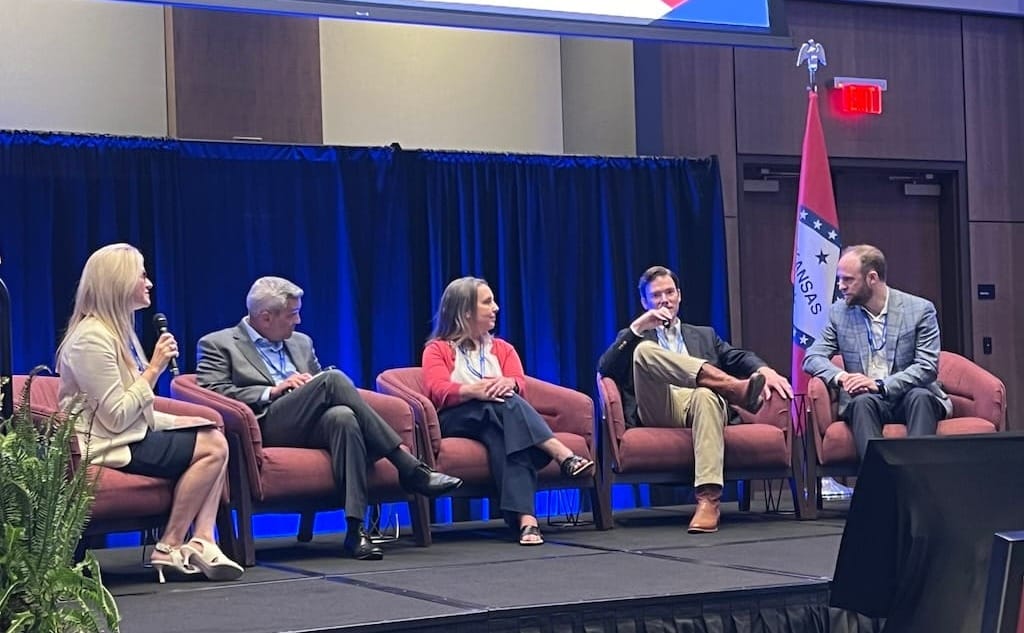
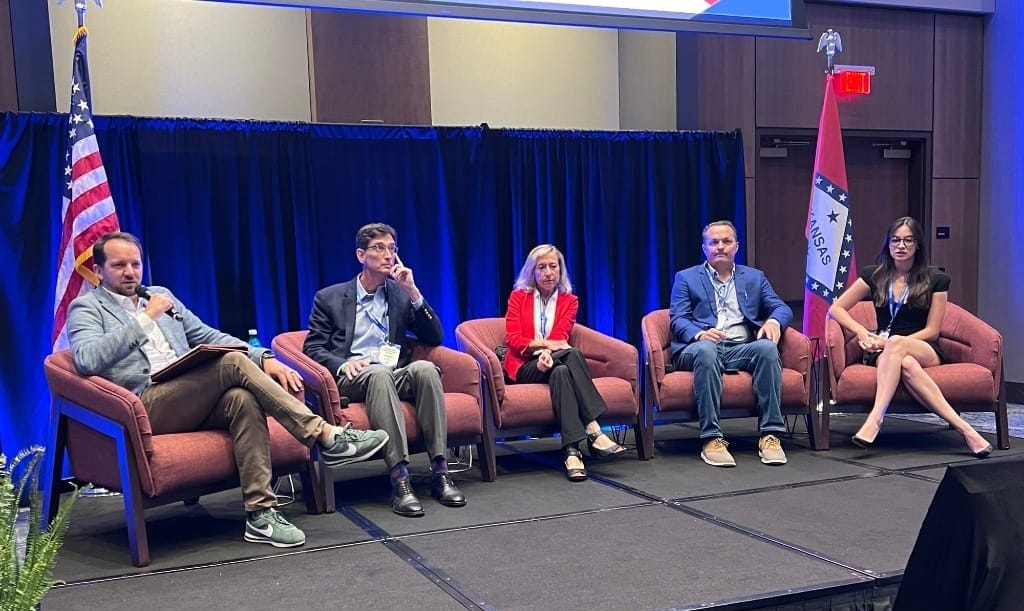
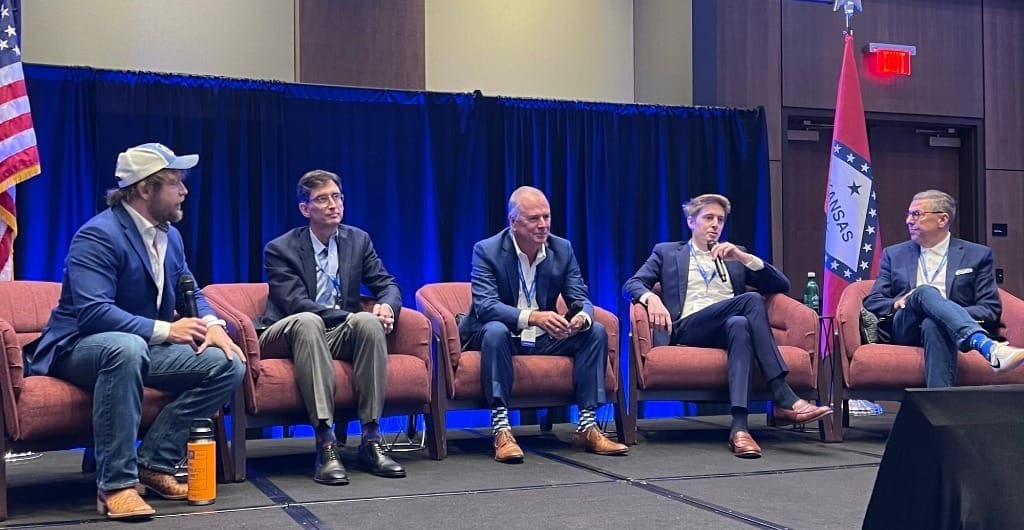
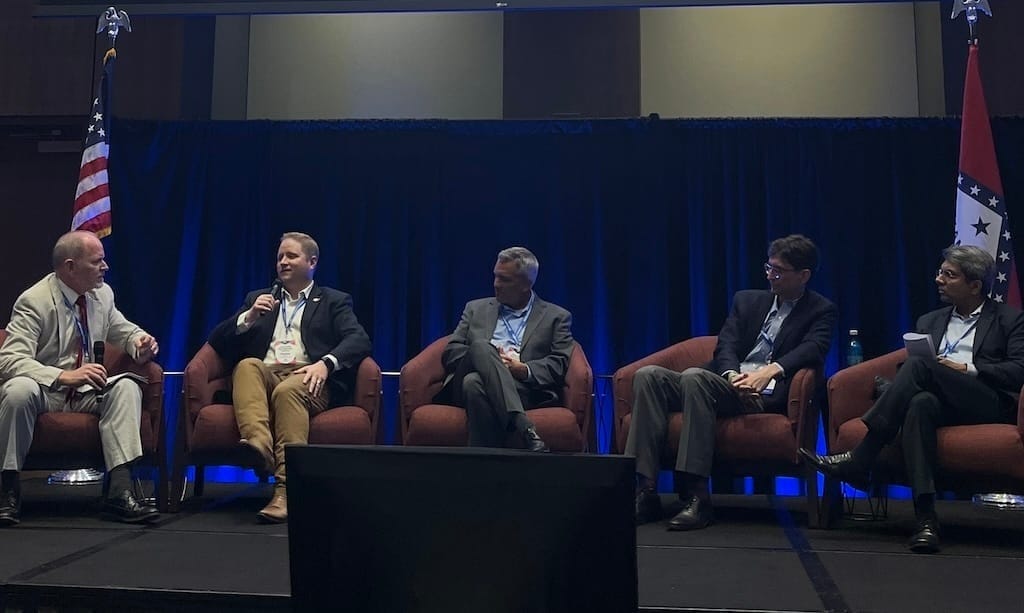
The afternoon’s sessions seamlessly pivoted to the equally substantive work of ensuring that higher-capacity broadband improves the quality of education, employment, health care and other aspects of life.
Attending these sessions reminded me of my prior work as the head of the Partnership for a Connected Illinois in 2010-2013. Another "heartland" state, Illinois is separated from Arkansas only by Missouri. In Illinois, our state broadband office worked holistically consider the specific purposes and quality-of-life elements that were improved with higher-capacity broadband.
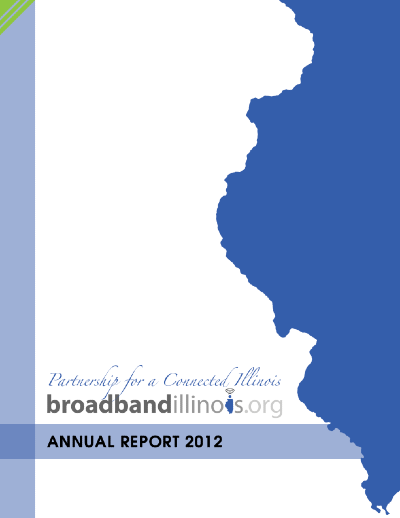
At the BEAD conference on Tuesday, Arkansas Broadband Director Glen Howie kicked off the afternoon by explaining how these quality of life goals will be captured by the rubric of “non-deployment” activities.
The state has received an allocation of $1.02 billion from the National Telecommunications and Information Administration’s BEAD program. It has submitted its Vol. 1 Initial Proposal, conducted its broadband mapping challenge processes, and is waiting upon NTIA approval of its Vol. 2 Initial Proposal.
Approval by NTIA, Howie said, will kick up the period in which it allocates from this $1 billion pool of funds for “deployment” funds by hiring Internet Service Providers to build broadband infrastructure - generally fiber - to the 190,000 addresses that have been deemed “unserved” or “underserved.”
Non-deployment funds
Arkansas does not yet know how much of the $1 billion it received as part of its BEAD allocation will be needed to get this infrastructure job done. “If it takes all $1 billion, so be it,” said Howie. That would mean that “we have no funding left for non-deployment” activities.

“However, the state and the team feel very confident that Arkansas will be one of the states” with the prized “non-deployment” funds available after allocating deployment funds.
Although Howie was hesitant to pin an exact number on the amount of funds available for “non-deployment” uses, Howie speculated on an amount between $50 million and $200 million. Hence “there is the potential for substantial non-deployment.”
The rest of the afternoon’s sessions considered particular aspects of how such non-deployment funds might be used, including efforts focused around digital equity, and also on educational partnerships, workforce development, health care delivery, and other topics.
It also led Howie to ask his version of the dream question: “If you were to propose a non-deployment project with excess BEAD funds, what would it be, and what people would you bring to the table?”
In an introductory session with Howie, Angela Thi Bennett, director of digital equity at the NTIA, and Philip Powell, federal program officer at the NTIA for Arkansas and Oklahoma, Bennett offered her own answer to that question for Arkansas: Food is medicine.
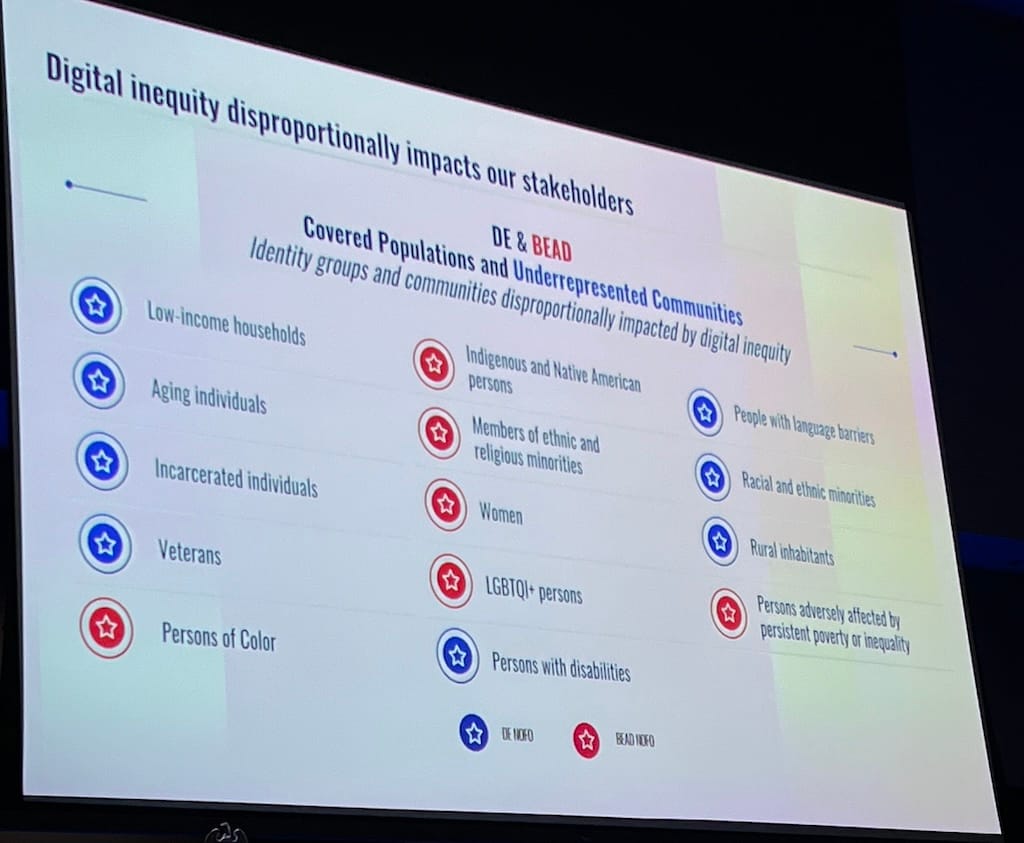
To Bennett, a great digital equity program for the state would use broadband to “create an ecosystem” of education about agriculture, incentivizing both farming and the small business efforts to enable the use of broadband in the purchase of locally-produced crops.
Partnerships for economic development
The following panel, on “Developing Partnerships: Arkansas’ Broadband Ecosystem is Ready,” brought together a range of community and economic development activists, each seeking to use the better broadband infrastructure enabled by BEAD for tangible economic activities.
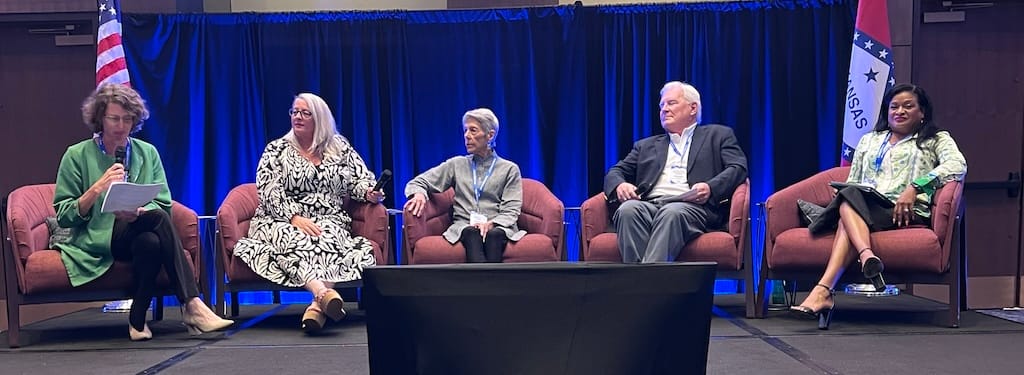
Catherine Krantz (second from left), area director for Broadband Communities Unlimited, a non-profit group in Arkansas seeking to promote technical assistance for local entities, spoke about the important work being placed by the Heartland Forward foundation: “They have a strong mission for broadband,” she said, and a united goal of ensuring that all Arkansas groups know about non-deployment projects so that they can help take advantage of better broadband.
Hal Vandiver (fourth from left), a member of the Independence County Broadband Committee, highlighted the work of Howie and the Arkansas Broadband Office in travelling on the road throughout the state and helping build a network of education and training partners that could, in turn, magnify the impact of broadband investment.
Workforce development issues
A panel on The New Digital Economy: Investing in Workforce and Economic Development,” highlighted the work of Heartland Forward in creating a jobs resource. But it also raised the question of improving the broadband workforce nationally.
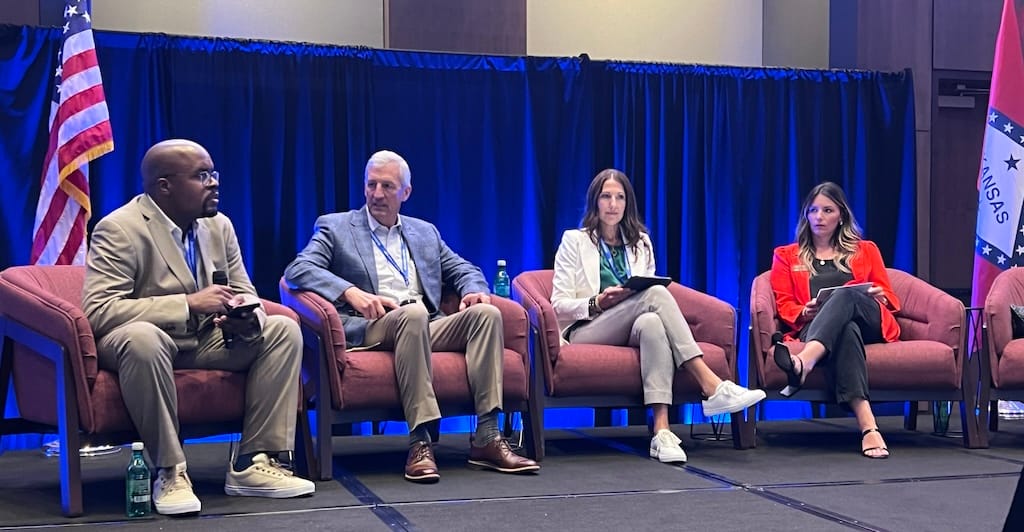
“Broadband is a national issue that needs to be solved locally,” said David Stehlin (second from left), CEO of the Telecommunications Industry Association. He highlighted TIA’s involvement in the Broadband Nation jobs resource, which launched in May and offers resources about broadband jobs.
But Tina Moore (third from left), director of workforce development for the Arkansas Department of Education, raised concerns about the O*NET-SOC taxonomy of jobs. The standard for “coding” jobs under certain search terms undervalues broadband, she said.
“There are no broadband codes in O*Net-SOC database,” said Moore. Such jobs may be listed under “telecommunications” or “fiber,” she said. But it will be hard to highlight the value of future broadband jobs without a reclassification.
Addressing Arkansas' maternal health crises
Arkansas currently has the highest rate of maternal mortality in the United States, and during a session on “Healthcare Delivery: Funding Innovation in Arkansas,” a panel of doctors and health experts devoted intellectual resources to the role of telemedicine in solving the problem.
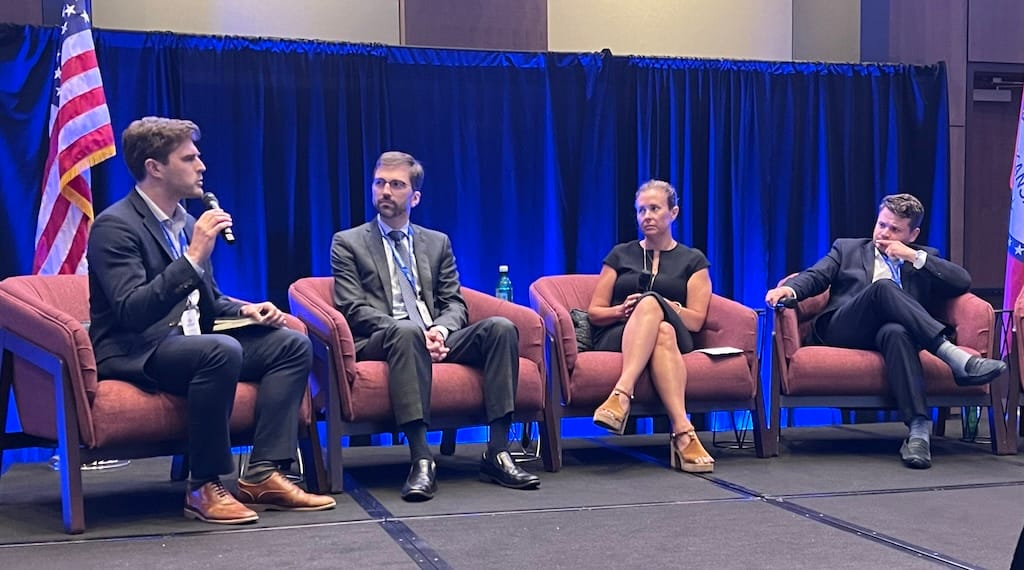
Cara Osborne (third from left), a senior fellow at Heartland Forward, said that “most of my time is spent thinking about maternal health.” For example, Arkansas has people licensing to birth babies in half of the state’s counties.
That’s a huge challenge, she said, but also an opportunity for telemedicine.
Moderator Jake Varn (left), associate manager of the Broadband Access Initiative at the Pew Charitable Trusts, used the panel discussion to focus on the pandemic-spurred lifting of federal and state restrictions on the practice of telemedicine.
When he asked what other innovations in healthcare might be spurred by broadband, Osborne replied: “Almost always good ideas come with first-hand experience. The reason health care is the ubiquitous issue is that we all have these first-hand experiences” with health care.
Learn more about the Arkansas BEAD Digital Opportunity Conference.








